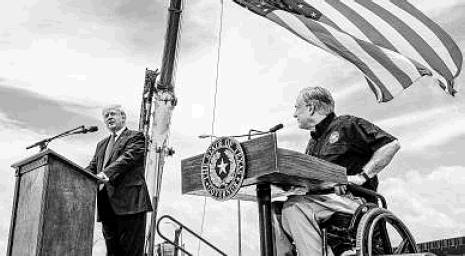Abbott’s four-county vote audit not enough for Trump
By Taylor Goldenstein AUSTIN BUREAU
Gov. Greg Abbott’s plan to audit the 2020 election results in four of the state’s biggest counties apparently did not pass muster for former President Donald Trump.
“By allowing the Democrats to do what they do, it will make it much harder for the governor and other Republicans to win election in 2022 and into the future,” Trump said in a statement to the Texas Tribune. “Texas is a much redder state than anyone knows, but this is the way to make sure it turns blue.”
Abbott’s spokeswoman, Renae Eze, said in a statement that “Texas is conducting the largest forensic audit in the country.”
“We have all the tools necessary to conduct a full, comprehensive audit, and that process will address any irregularities and ensure all valid votes are counted,” she said.
Last week, Trump in a public letter had pushed Abbott — whom the former president has endorsed ahead of the 2022 Republican primary — to add legislation to the Legislature’s special session agenda that would make it easier for counties to audit election results.
“Texans know voting fraud occurred in some of their counties,” Trump wrote in the letter, despite a lack of evidence of vote fraud beyond isolated incidents affecting a handful of votes in an election in which more than 11 million Texans cast ballots.
Later that day, the Texas secretary of state’s office announced it would audit Collin, Dallas, Harris and Tarrant counties’ election results, without providing much detail.
The office clarified in a document released Tuesday night how the audit would work, and much of it was already required of counties as part of routine election procedure review. The second phase was set to begin in spring 2022 and would involve reviewing voting machine accuracy tests, lists of voters, training materials and other election-related documents.
But Trump has been specific about his demand from the get-go: He wants House Bill 16, authored by Rep. Steve Toth, R-The Woodlands, to be added to the special session call and approved.
The bill would require county clerks to convene an “election review advisory committee” to review 2020 election results from randomly selected precincts if a state or county party chair requested it. Other provisions would make it easier for candidates and others to request audits from their county clerk or the secretary of state.
Local governments would bear the brunt of the costs; the Legislative Budget Board earlier this month estimated that the fiscal hit could be “significant” but did not provide dollar figures “due to not knowing the volume of potential future requests.”
The bill has garnered support in the Texas Senate.
At the end of the last special session, Republican Sen. Paul Bettencourt had introduced a nearly identical version of the bill, Senate Bill 97, that the chamber jammed through on the last day.
The bill’s chances in the House are uncertain, and Speaker Dade Phelan’s office did not respond to a request for comment.
Toth, in a July interview with the Washington Post, declined to say whether he believed there was any fraud in his own 2020 election. In the same interview, Toth also made clear that his concerns were partisan-driven when he was asked whether audits ought to be conducted in small counties — in addition to the large urban ones that tend to be Democratic-led.
“What’s the point?” he told the newspaper. “I mean, all the small counties are red.” taylor.goldenstein@chron.com
